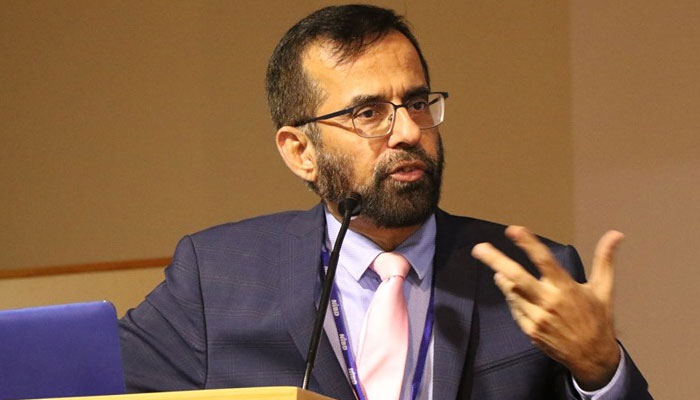Cancer patients suffer as spurious medicines of Indian origin being smuggled into Pakistan
Forty-two-year-old Irfan Ahmed, a sales agent by profession and father of three, was diagnosed with blood cancer early this year and a team of oncologists in Karachi had suggested chemotherapy and anti-cancer medicine for his treatment.
Despite receiving dozens of costly injections and oral medicine worth thousands of rupees, Irfan’s condition continued to deteriorate and it emerged later that anti-cancer medicines given to him were of Indian-origin and most of them were spurious or ineffective.
As much as 50 per cent of the anti-cancer medicines used in Pakistan are of Indian origin as Pakistani pharmaceutical companies produce less than two per cent of the required quantity of drugs, said Prof Dr Tahir Shamsi, an eminent hematologist and oncologist, while talking to The News on Friday.
Since the Pulwama attack in February 2019, he said, medicines especially anti-cancer medicines were not being allowed to enter Pakistan through legal channels, causing immense hardships for patients in Pakistan.
“Over 50 per cent of medicines used for the treatment of various types of cancers among children, women and men in Pakistan used to come from India. They are not coming to Pakistan anymore through legal channels since tensions escalated between the two states early this year. This is resulting in serious repercussions for cancer patients in Pakistan.”
Due to the closure of legal channels for the import of medicines from India, the smuggling of drugs, especially anti-cancer medicines, has increased manifolds, but in addition to genuine and effective drugs, a huge quantity of spurious, fake and suspicious generic medicines are also said to being brought to Pakistan through various channels, jeopardising the lives of cancer patients in the country.
A team of officials of the Pakistan Customs confiscated a huge cache of Indian medicines, mostly chemotherapy and anti-cancer medicines, when they raided a warehouse in the Saddar area of Karachi on Thursday night. All the medicines and injections, required to be kept in a proper condition, were packed in paper boxes and there was no system of maintaining cold chain of important medicines.
Pharmacists and officials from the provincial drug administrations say smuggled medicines hardly prove effective against any disease as they are not transported in suitable temperature and environment, while often spurious and suspicious medicines are brought into the country as there is no system in place to track companies of their origin.
Prof Shamsi said cancer patients in Pakistan were dependent on drugs imported from other countries and regions, including Europe, the United States, China and mostly India.
Another renowned oncologist and specialist of treating children with cancer, Dr Shamvil Ashraf, said Indian medicines were the “drugs of choice” for Pakistani physicians as they were of good quality and very cheap as compared to European and American medicines, but unfortunately most of these drugs were not available legally.
“Indian anti-cancer medicines are of good quality as well as cheap as compared to European and American drugs. Unfortunately, there is not proper system in place to import them, so the local market is flooded with smuggled drugs, whose efficacy, mode of action and ability to cure is questionable,” he said.
Dr Shamsi said that as the cold chain of smuggled medicines, especially injections, was not maintained, they hardly proved effective in cancers while their availability had also become an issue, resulting in serious problems for patients undergoing treatment.
“Cancer patients need a regular supply of anti-cancer medicines and chemotherapy, but in case of smuggled medicines, their supply is suspended sometimes, and the patients suffer. Often patient die when they don’t get a sustained supply of a particular anti-cancer medicine.”
Cancer specialists said that like elsewhere in the world, cancers among people in Pakistan were also on the rise, but unfortunately anti-cancer medicines and drugs were not available, as Pakistan was 98 per cent was dependent on imported drugs for the treatment of its patients.
“The Government of Pakistan and the Drug Regulatory Authority of Pakistan will have to look into this important issue and ensure local production, a sustained supply of anti-cancer medicines to protect precious lives in the country,” said Dr Ashraf.
-
 Iceberg A-23A Turns Blue As Scientists Warn Collapse Is Imminent
Iceberg A-23A Turns Blue As Scientists Warn Collapse Is Imminent -
 FIFA Selects Stats Perform For Betting Data And Live Streaming
FIFA Selects Stats Perform For Betting Data And Live Streaming -
 Is Jessica Simpson Really Joining 'The Bachelorette'?
Is Jessica Simpson Really Joining 'The Bachelorette'? -
 Brayden Point Injury Raises Concern After Early Exit For Tampa Bay Lightning
Brayden Point Injury Raises Concern After Early Exit For Tampa Bay Lightning -
 Meghan Trainor Addresses 'toxic Mom Group' Rumours Again
Meghan Trainor Addresses 'toxic Mom Group' Rumours Again -
 Mattel Autistic Barbie Doll Aims To Boost Representation And Inclusion
Mattel Autistic Barbie Doll Aims To Boost Representation And Inclusion -
 William Makes Calculated Move To Future-proof His Public Role Amid Harry Return
William Makes Calculated Move To Future-proof His Public Role Amid Harry Return -
 Elijah Wood Breaks Silence On Possible Return To New 'Lord Of The Rings' Film
Elijah Wood Breaks Silence On Possible Return To New 'Lord Of The Rings' Film -
 Aaron Rodgers Wife: What The NFL Quarterback Has Said About His Marriage
Aaron Rodgers Wife: What The NFL Quarterback Has Said About His Marriage -
 Buckingham Palace Shuts Down Claims It Can Step In On Harry’s Security
Buckingham Palace Shuts Down Claims It Can Step In On Harry’s Security -
 Oilers Vs Blackhawks Recap: McDavid, Bouchard Lead Edmonton
Oilers Vs Blackhawks Recap: McDavid, Bouchard Lead Edmonton -
 Why Jennifer Garner, Jennifer Lopez Didn't Pose Together At Golden Globes
Why Jennifer Garner, Jennifer Lopez Didn't Pose Together At Golden Globes -
 Apple Turns To Google’s Gemini To Deliver Long-awaited Siri Revamp In 2026
Apple Turns To Google’s Gemini To Deliver Long-awaited Siri Revamp In 2026 -
 Nicola Peltz Lifts The Lid On New Twist In Beckham Feud
Nicola Peltz Lifts The Lid On New Twist In Beckham Feud -
 Rihanna Responds To The Possibility Of Having Another Child
Rihanna Responds To The Possibility Of Having Another Child -
 Brooks Nader Opens Up About Dissolving Her Lip Filler
Brooks Nader Opens Up About Dissolving Her Lip Filler




